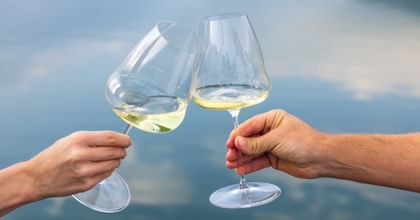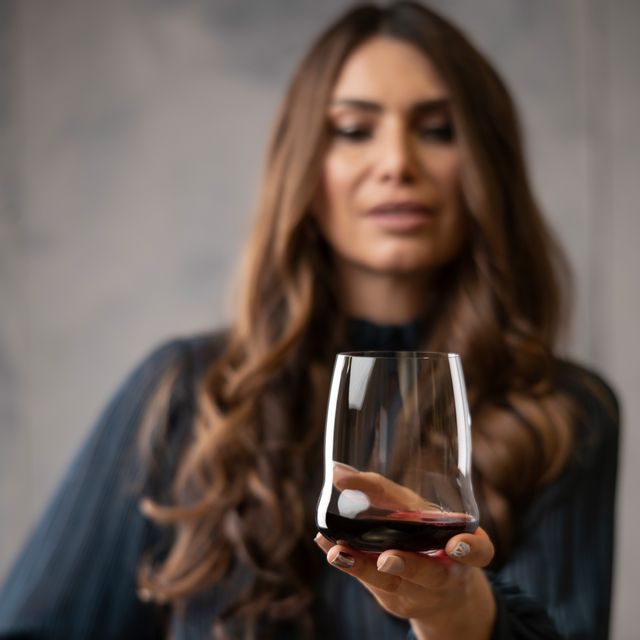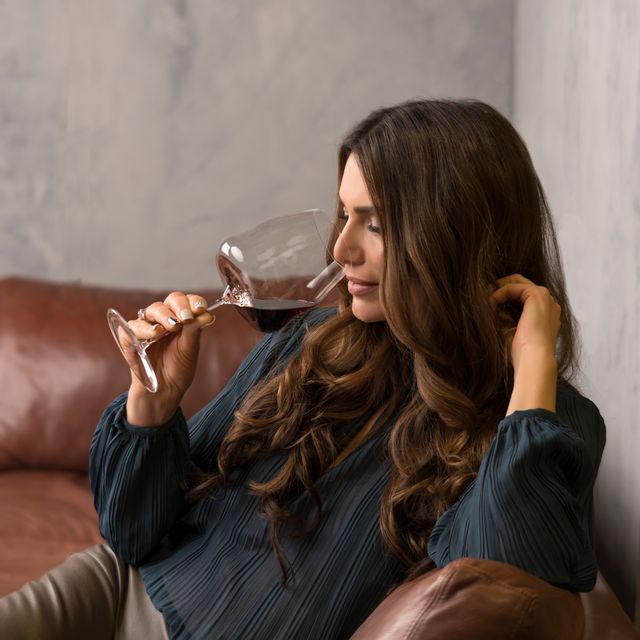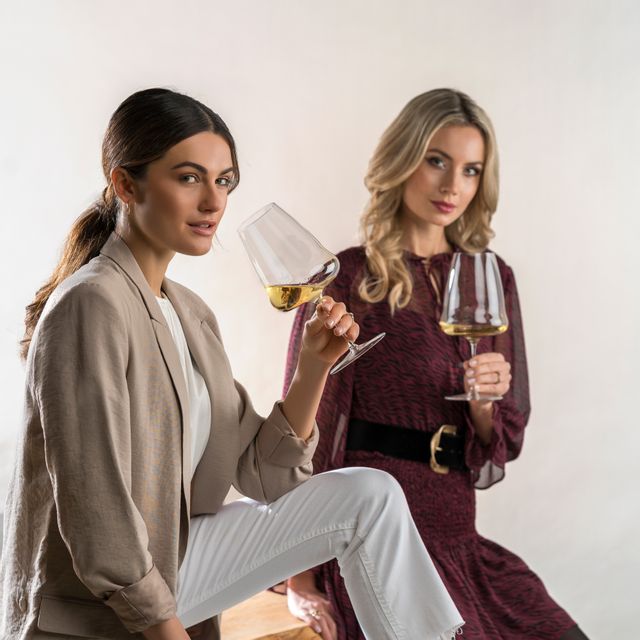see, smell, taste
The Importance of the Senses in a Wine Tasting

Have you ever taken part in a wine tasting? They are an excellent way of exploring and appreciating the complexities of wine. Carried out by a wine expert who guides participants through a selection of wines that represent different styles, regions, and grape varieties, wine tastings take you through seeing, smelling, and tasting the wine to fully appreciate its characteristics.
At RIEDEL, our philosophy is that maximizing the three senses of sight, smell, and taste is crucial for overall wine enjoyment, so we make it our mission to help wine lovers experience each aspect to the fullest when enjoying wine. Here's how each sense impacts our perception of wine:

Step one
see
- The color of the wine can indicate its age, grape variety, and geography. For example, a young red wine is usually a bright ruby-red color, while an older red wine may have a paler orange hue. A white wine from a cool climate may be a pale yellow, while one from a warm environment may exhibit a rich golden hue.
- 'Clarity' describes a wine's reflective quality, such as whether it is clear, brilliant, hazy, or dull, which can tell you its production. Cloudy or hazy wine may indicate that the wine was made using traditional methods with minimal intervention, while bright, clear clarity suggests that a wine has undergone more post-fermentation processes, such as fining and filtration.
- We can observe a wine's viscosity (i.e. its thickness) to indicate its body and texture. A thick, syrupy wine is usually full-bodied and/or rich due to alcohol and sugar being more viscous than water, while we can expect a thin wine with low viscosity to be light-bodied and refreshing.
As well as telling us about the wine we're about to taste, the visual element of wine makes a considerable difference to our overall wine enjoyment - and any other drink, for that matter. Studies have found that we perceive well-presented food and drink as better tasting than less attractive cuisine, so it's crucial that the wine and the glass we sip it from look the part.
Since wine is often enjoyed without garnish or other ingredients, much of the onus falls on the glassware we use to give the wine visual appeal. We craft RIEDEL wine glasses using the finest crystal to achieve the highest level of brilliance and clarity, allowing your wine to look its best every time. The durability and superior strength of crystal glass compared to regular glass also enables us to create fine, dazzlingly-designed wine glasses, such as our innovative RIEDEL Winewings Collection.

Step two
smell
The next step in a wine tasting is smelling the wine. Smelling wine allows us to detect its aromas, which can tell us a lot about its complexity, character, and quality. For example, fresh fruit aromas may indicate a young wine, while an older wine may have more complex, aged aromas. Taste and aroma are firmly linked; approximately 80% of what we perceive as taste comes from our sense of smell, making observing a wine's aromas an unmissable step of any wine experience.
The aromas a wine can display are incredibly varied and include fruit, floral, herbal, spicy notes, and complex aromas such as oak, smoke, or earthy tones. A wine's aromas can indicate elements such as the grape variety, the region where the wine was produced, the fermentation and aging processes, and the age of the wine.
To fully appreciate a wine's aromas, it helps give the wine a good swirl first. Doing so allows the wine to breathe, helping to release the volatile compounds that create the wine's aroma. If you're doing a home wine tasting for just yourself and a few friends, an even better way to achieve this is to decant your wine using your RIEDEL decanter for around 30 minutes before beginning the tasting. To learn more about the art of decanting, visit our blog titled A Guide to Decanting Wine.

Step three
Taste
- Like its aroma, a wine's flavor is influenced by a range of factors, including the grape variety, the winemaking style, and the age of the wine. The flavors can range from fruity and sweet to dry and tannic and can include complex notes of things such as minerals, tobacco, or leather.
- Texture refers to a wine's mouthfeel, which can be influenced by factors such as tannins, acidity, and alcohol content. A wine with high tannins may feel dry and astringent in the mouth, while a wine with low tannins may feel smooth and velvety.
- The finish refers to the wine's aftertaste that lingers in the mouth after swallowing. A wine's finish reveals the extent of its complexity and depth and can range from a short and crisp to a long, lingering aftertaste that develops with time.
So you see, the sight, smell, and tasting of wine all help to inform us about its character and background. Ignoring even a single one of these three crucial elements of observation will result in an incomplete experience, and we think a good glass of wine deserves our full attention.
RIEDEL Wine Glass Experiences
If you've ever attended a RIEDEL Wine Glass Experience, you'll know they differ from regular wine tastings in that the focus is on highlighting how using the proper glass can elevate a wine's qualities and, in turn, how using the wrong glass can harm how a wine's character comes across. The senses of sight, smell, and taste remain crucial in a RIEDEL Wine Glass Experience as we demonstrate how a RIEDEL wine glass enhances the behavior and qualities of wine.
For more information on our fascinating, perspective-altering RIEDEL Wine Glass Experiences, check out our blog titled How a Comparative Tasting Will Change Your Wine Life.
For details on upcoming RIEDEL Wine Glass Experiences, including how you can buy your next ticket, visit our Events page.
Locations